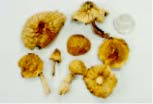
Parent's Guide
(Awareness)
| <Previous | Next> |
26. Hallucinogens
Phencyclidine (PC) interrupts the functions of the neocortex, the section of the brain that controls the intellect and keeps instincts in check. Because the drug blocks pain receptors, violent PCP episodes may result in self-inflicted injuries. Users frequently report a sense of distance and estrangement. Time and body movements are slowed down. Muscular coordination worsens and senses are dulled. Speech is blocked and incoherent.
 In later stages of chronic use, users often exhibit paranoid and violent behavior and have hallucinations. Large doses may produce
convulsions and coma, as well as heart and lung failure. Lysergic acid (LSD), mescaline, and psilocybin cause illusions and hallucinations.
The physical effects may include dilated pupils, elevated body temperature, increased heart rate and blood pressure, loss of appetite, sleeplessness,
and tremors. The user may experience panic, confusion, suspicion, anxiety, loss of control and flashbacks, even after ceasing use.
In later stages of chronic use, users often exhibit paranoid and violent behavior and have hallucinations. Large doses may produce
convulsions and coma, as well as heart and lung failure. Lysergic acid (LSD), mescaline, and psilocybin cause illusions and hallucinations.
The physical effects may include dilated pupils, elevated body temperature, increased heart rate and blood pressure, loss of appetite, sleeplessness,
and tremors. The user may experience panic, confusion, suspicion, anxiety, loss of control and flashbacks, even after ceasing use.
|
Type
|
What is it called?
|
What does it look like?
|
How is it used?
|
| Phencyclidine | PCP, Hog, Angel Dust, LoveBoat, Lovely, Killer Weed | Liquid, white crystalline powder, pills, capsules | Taken orally, smoked (sprayed on joints or cigarettes) |
| Lysergic acid diethylamide | LSD, Acid, Microdot, White lightning, Blue heaven, and Sugar cubes | Colored tablets, blotter paper, clear liquid, thin squares of gelatin | Taken orally, licked off paper, gelatin and liquid can be put in the eyes |
| Mescaline and Peyote | Mesc, Buttons, and Cactus | Hard brown discs, tablets, capsules | Disc-chewed, swallowed, or smoked. Tablets and capsules taken orally |
| Psilocybin | Magic Mushrooms, 'shrooms | Fresh or dried mushrooms | Chewed and swallowed |
| <Previous | Next> |
Did you know...
Know symptoms of Drug abuse
This page helps the parents to know about the symptoms of drug abuse and show their kid that how serious they are about it...
Drugs Desciptions and Effects
Select a drug from the drop down menu to get more information from National Institute on Drug Abuse at drugabuse.gov :
